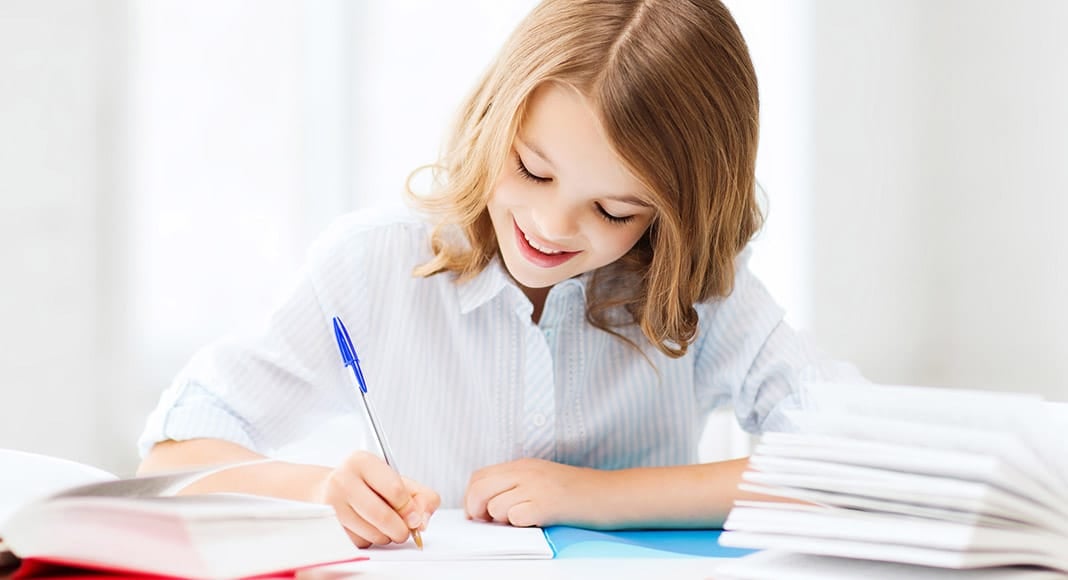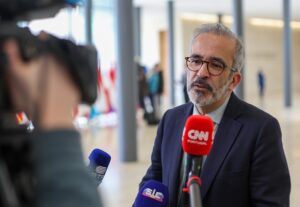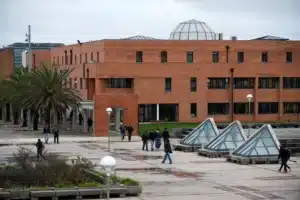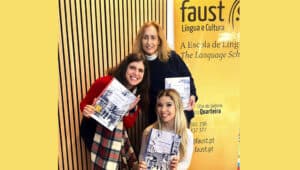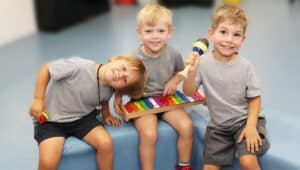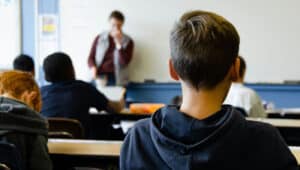(Advertiser’s Announcement)
Learning across the age groups at both the national and international sections of the Nobel International Algarve School continues in earnest as schools in Portugal were told to close their physical doors early in March.
Having anticipated this closure, the school’s leadership teams for both national and international sections began meeting to plan a move to online learning in February and was ready to launch a virtual learning programme for students aged five to 18 on the first day of closure, Monday, March 16.
The school’s Head of Sixth Form, David Green, said: “Our online learning is well underway for our secondary students. They are using Google Classroom, where assessments and activities are being uploaded on a daily basis, as well as examination practice and daily teacher feedback. Skype conferences have also provided extra support to students and communication with teachers. There has been positive feedback from students as their hard work continues to flood in.”
Claire Jones, Head of International Primary, and Marisa Nunes, Head of National Primary, agreed: “This has been a hugely significant step in the learning of the children and the professional development of our Primary team. We often talk to the students about the need to be adaptable and independent learners and, suddenly, there has never been a greater need for all of us to adopt these skills. Since learning moved online, we have been immensely proud of how enthusiastic and fully engaged our students have been, and it has been so lovely to see the photographs and videos flooding in – it’s clear that everyone is on board and enjoying this strange, new experience!”
Claire Jones added: “We have already had an online assembly which focused on what type of learners the children are – something to get them thinking about how they approach their work at home. There is a wealth of online resources to dip into to make learning engaging and to support the work our teachers are leading.
“For the Primary children, there is definitely more to the online experience than simply completing work tasks – their daily routine is so important. With more than 40 nationalities represented in our 200 Primary children, it’s highly likely that, in some of our families, there may be no one at home who is able to help with the work at a linguistic level and also the children rely on the familiarity of daily school life. It is so important for them to still see the faces and hear the voices of their teachers who they place their trust in every day. We don’t want to see them lose the bonds that we have worked so hard to build.”
This week, national section Primary children had the excitement of seeing Ms Nunes, joined by a large fluffy koala bear on her sofa, reading “Coala”, a poem, to inspire the children to read their own poems during the school’s Poetry Slam this week.
Thanks to being part of Globeducate, one of the leading international school groups in the world, Nobel Algarve students and teachers will not be isolated to their southern coastal region of Portugal during this unusual period.
As well as intra- and inter-class activities and opportunities to connect, there will be global online learning events, such as the Globeducate Poetry Slam Challenge which celebrated World Poetry Day on March 21 and saw students explore their creative expression through poem recitals. More global collaboration is anticipated over the coming weeks, with some creative and engaging online competitions and events, including Lego and Physical Education.
Nobel International School Algarve has two campuses, Lagoa and Lagos, and a third due to open in September 2020 in Almancil. Uniquely in the Algarve international schools market, it is also able to draw on the resources of its parent schools group, Globeducate.
Head of School Mike Farrer said: “At times like this, unprecedented until now, there is a huge benefit to belonging to a global community of schools. We have been able to watch what unfolded in Italy and learn from what our colleagues there did in the international schools we have in Rome, Milan and Florence. We have a fantastic community of educators to connect with and to share ideas and good practice with. Every day, our teachers are able to communicate through Microsoft Teams with their colleagues in other countries.”
Education Director for Globeducate, Oanh Crouch, has worked for the last 12 months with Chief Education Officer, Daniel Jones, on developing the group’s virtual learning presence; something that Nobel Algarve teachers have already benefitted from.
“Professional learning communities are powerful tools in developing a learning-focused school. For the last 12 months, we have been prioritising connecting educators. We know the value of creating opportunities for professional dialogue; building online virtual learning communities has been pivotal for creating a culture of collaboration across the group – allowing teachers to question, explore and learn together in order to expand and challenge their thinking. These online learning communities include our Reading Community and Outdoor Learning Community for educators to share good practice and to discover new and interesting ways of learning to impact back into their classrooms and schools.
“With online learning a reality, we have continued to provide virtual learning communities by connecting schools together in some very creative ways. Heads meet, senior leaders meet, coordinators and teachers meet Primary and Secondary, different key stages, different subjects to support each other – everyone shares good practice, and this has a significant effect on impactful learning. We meet weekly to share highlights and how to overcome challenges. Adding the challenge of home-schooling to our existing communities has been embraced by all of our colleagues and as soon as we knew all schools would be facing this challenge, we felt ready to support each and every one of our 51 schools across the world.”
Wellbeing in isolation for children and teenagers
Moving from physical to virtual school is a huge transition even for the ‘digital native’ generation – students may feel anxious and may be at risk of loneliness.
Nobel International School Algarve student counsellor Sara Aparício, who runs the international section education psychology department, says: “Be particularly mindful of news and information management. Young people, especially those who may have their own phone or laptop, may be very well connected with current news and this can cause huge spikes in anxiety as they often lack the maturity to make sense of everything they read, so make sure they are accessing reliable information and that you keep the channels of communication open. Keep a check on what you’re talking about around them as well, trying to avoid passing your own anxiety on to them.”
Sara shares some additional tips for encouraging a positive isolation period experience:
1. Ensure students find ways to connect with their peers – if they haven’t been allowed to use Whatsapp or don’t because of their age, then ensuring opportunities for Skype/Zoom online chats can keep them talking to friends. Allow them some privacy for online social time, too.
2. Find a routine that works well with the rest of the family and your son or daughter’s best times for working. Agree on a timetable and display it on a wall; they should stick to regular bedtimes and morning wake-up times. If they’re going to be home alone due to parents working in, for example, healthcare or banks, then create regular check-in times.
3. Keep active – maybe it’s an opportunity to increase the level of helping around the home, cleaning the house to music, dancing, going up and down stairs, and following online exercise classes on YouTube or on the TV.
4. Get as much sunlight and fresh air as possible! Gardening can give young people some valued quiet time in the outdoors. Younger children might enjoy setting up a camp outdoors or creating their own miniature garden; they might also enjoy growing seeds indoors (order online) and printing images of their favourite places in nature. If you have a family dog, a daily walk close-by is a great way to build up independence, too.
5. Find ways to relax and be creative. There are lots of different ways young people can take notice of the present moment and use their creative side: arts and crafts, DIY, colouring, mindfulness, playing musical instruments, singing or listening to music (there are even online choirs you can now join, for example www.homechoir.co.uk), writing, yoga and meditation. 



